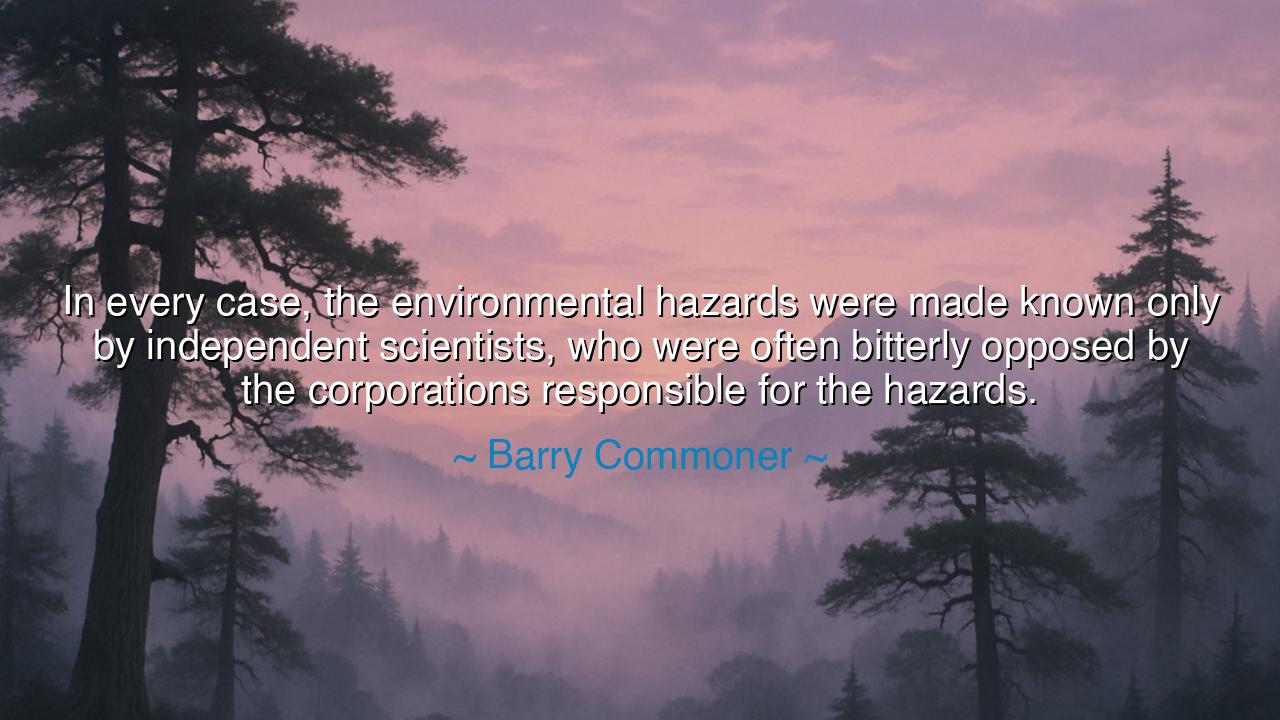
In every case, the environmental hazards were made known only by
In every case, the environmental hazards were made known only by independent scientists, who were often bitterly opposed by the corporations responsible for the hazards.






In the solemn tone of a prophet who had seen truth resisted by power, Barry Commoner once said, “In every case, the environmental hazards were made known only by independent scientists, who were often bitterly opposed by the corporations responsible for the hazards.” This is not merely a statement of fact—it is a lament, a warning, and a call to courage. Within these words lies the ancient struggle between truth and profit, between the guardians of knowledge and the merchants of denial. Commoner, a biologist and one of the fathers of modern environmentalism, spoke not from theory but from witnessing, for he had seen how the earth’s wounds were first revealed not by governments or industries, but by those who refused to be silenced by their employers, their peers, or the powerful interests arrayed against them.
The origin of this quote lies in Commoner’s long campaign to awaken humanity to the ecological consequences of its own ambition. During the mid-twentieth century, when industrial progress was worshiped as divine and pollution dismissed as the price of prosperity, Commoner stood as one of the few voices of conscience. His investigations into nuclear fallout, toxic chemicals, and air pollution exposed how corporations had hidden the dangers of their own creation—often discrediting or intimidating the scientists who dared to tell the truth. His words, then, are both a tribute to these independent seekers of truth and an indictment of those who would poison the world for profit.
To the ancients, such a struggle would have been seen as a battle between the sacred and the profane. In the Greek world, the oracle of Delphi spoke truth that kings dared not hear, and for that reason, she was both revered and feared. Likewise, the independent scientist in Commoner’s age was a modern oracle—bearing messages from the wounded earth, whispering of dangers unseen, while those who profited from destruction sought to drown her voice. “Bitterly opposed,” Commoner writes, not to exaggerate, but to reveal the fury with which greed resists accountability. For truth, when it threatens the comfort of power, is always treated as treason.
History bears witness to this pattern. Consider the story of Rachel Carson, whose book Silent Spring exposed the deadly effects of pesticides like DDT. She was not funded by any corporation, nor protected by political power—she was an independent scientist, working in defiance of an industry determined to destroy her reputation. Chemical companies labeled her hysterical, unpatriotic, even anti-science. Yet her findings, born of integrity and persistence, changed the course of history. Her courage led to the ban of DDT and gave birth to the environmental movement. Carson’s struggle is the living proof of Commoner’s warning: that those who reveal environmental hazards often walk alone, but their truth endures long after the noise of their detractors fades.
Commoner’s message carries a deeper moral truth. The corporations responsible for the hazards, he reminds us, are not merely negligent—they are bound by a system that prizes profit above life. When the earth is seen only as resource, and people only as consumers, truth becomes an inconvenience. In such a world, it falls to the independent spirit—to the scientist, the journalist, the citizen—to stand apart, to question, to investigate, to speak. His statement is thus a call not only to scientists but to all who would be free thinkers: independence of mind is the seed of justice, and silence in the face of harm is complicity.
There is also hope in his words. The independent scientist, though opposed, is never powerless. For truth, once spoken, cannot be unspoken; it becomes a river that carves its way through stone. Commoner himself proved this. His campaigns for cleaner air, renewable energy, and ecological awareness transformed public policy and consciousness alike. From his defiance grew movements that changed laws, saved rivers, and restored balance to the conversation between humanity and nature. The lesson is clear: though power may suppress truth for a season, it cannot do so forever.
Let this then be the lesson for all generations: truth requires independence, and independence demands courage. Do not wait for permission to speak what is right. The earth, the air, and the waters cannot defend themselves—they depend upon those who see clearly and dare to tell what they see. Study deeply, question boldly, and when you find the truth, guard it with your life, for it is the lifeblood of civilization.
So remember the wisdom of Barry Commoner: that progress without conscience is ruin, and silence in the face of injustice is surrender. The independent mind, though mocked and opposed, is the conscience of the world. And as long as there are those who choose truth over comfort, the earth still has defenders, and the future still has hope.






AAdministratorAdministrator
Welcome, honored guests. Please leave a comment, we will respond soon